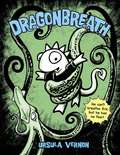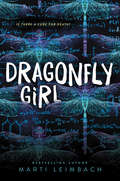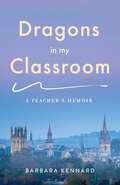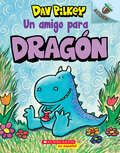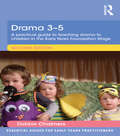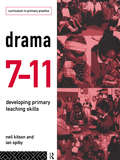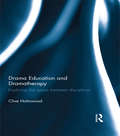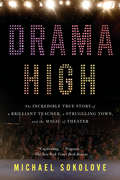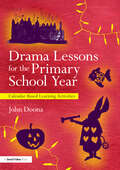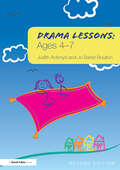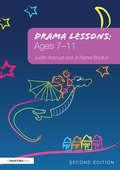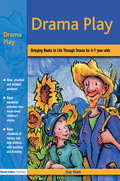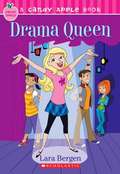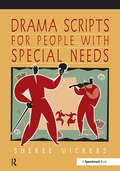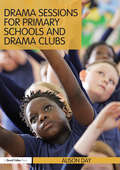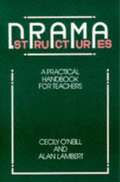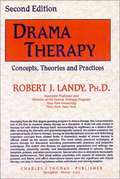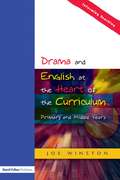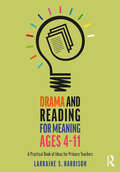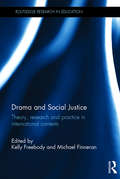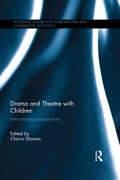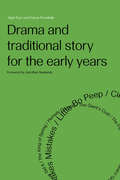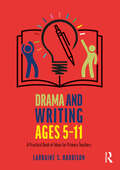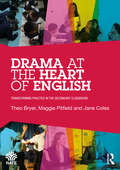- Table View
- List View
Dragonbreath
by Ursula VernonDanny Dragonbreath knows girls are trouble, but the new foreign exchange student, Suki the Salamander, is beyond trouble. Not only has she reduced his best friend, Wendell, to a blithering lovesick tadpole, but she's also the object of an elaborate ninja frog kidnapping plot.
Dragonfly Girl
by Marti LeimbachIn this spellbinding thriller and YA debut from bestselling author Marti Leimbach, Kira Adams has discovered a cure for death—and it may just cost her life.Things aren’t going well for Kira. At home, she cares for her mother and fends off debt collectors. At school, she’s awkward and shy. Plus, she may flunk out if she doesn’t stop obsessing about science, her passion and the one thing she’s good at . . . very good at.When she wins a prestigious science contest she draws the attention of the celebrated professor Dr. Gregory Munn (as well as his handsome assistant), leading to a part-time job in a top-secret laboratory. The job is mostly cleaning floors and equipment, but one night, while running her own experiment, she revives a lab rat that has died in her care. One minute it is dead, the next it is not. Suddenly she’s the remarkable wunderkind, the girl who can bring back the dead. Everything is going her way. But it turns out that science can be a dangerous business, and Kira is swept up into a world of international rivalry with dark forces that threaten her life.
Dragons in My Classroom: A Teacher's Memoir
by Barbara KennardAs a young book lover with dyslexia, Barbara found the solution to her reading struggles in Miss Gluding, her first grade teacher, who showed compassion for her student&’s plight—and knew how to help her. From that time on, Barbara knew what she wanted to be: a teacher, just like Miss Gluding.Unfortunately, Barbara also had some bad teachers in the years that ensued—including her sixth grade teacher, an exacting woman who called attention to Barbara&’s learning disabilities in front of classmates. Still wanting to follow in Miss Gluding&’s footsteps in 1964, Barbara vowed she would be a better one than her sixth grade teacher; instead, however, she became very much like her, with unattainable expectations for her students and herself. After seventeen years in the teaching profession, she realized she had to either change her teaching style or change careers. By providence, right as she stood at this crossroads, she was offered the opportunity to teach overseas at The Dragon School in Oxford, England, for a year—an opportunity she jumped at.In the year that followed, Barbara would rely on her faith in God to give up a lot of what she knew about teaching and learn to do it differently—ways that wouldn&’t have room for her perfectionism. In short, she would have to begin again.
Dragón 1: Un libro de la serie Acorn (Dragon Ser. #1)
by Dav PilkeyFrom Dav Pilkey, creator of the New York Times bestselling Dog Man and Captain Underpants series, comes Dragon, the heartwarming hero adored by Dav's youngest readers¡La versión en español de Un amigo para Dragón, de la serie ACORN!Dragón tiene un amigo, ¡y le encanta pasar tiempo con él! Le gusta contarle historias de miedo, hacerle chistes y prepararle bocadillos. Pero no es hasta que su amigo parece estar enfermo, que Dragón demuestra lo que significa la verdadera amistad. En este cálido cuento, ¡Dav Pilkey nos brinda un héroe adorable que a todos les encantará!This series is part of Scholastic's early reader line, Acorn, aimed at children who are learning to read. With easy-to-read text, a short-story format, plenty of humor, and full-color artwork on every page, these books will boost reading confidence and fluency. Acorn books plant a love of reading and help readers grow!Lonely Dragon has made a friend, and he loves spending time with his new buddy! He enjoys telling scary stories, cracking funny jokes, and fixing a midnight snack for them to share. But when his friend appears to be ill, Dragon demonstrates what it means to be a true friend. In this warmhearted friendship story of love and loss, Dav Pilkey has created a lovable hero that everyone will cheer for!
Drakulata erehiva sherlock holmes - ඩ්රැකියුලාට එරෙහිව ෂර්ලොක් හෝම්ස්
by Chandana Mendis - චන්දන මෙන්ඩිස්ඩ්රැකිවුලා පිළිබඳව ලියැවුණු රහස් පරීක්ෂක ප්රබන්ධයකි.
Drama 3-5: A practical guide to teaching drama to children in the Early Years Foundation Stage (Essential Guides for Early Years Practitioners)
by Debbie ChalmersWould you like to offer constructive, creative and exciting new dramatic learning experiences to the children in your setting? The importance of using drama to promote active and creative learning in the early years is widely recognised, and this fully updated second edition of Drama 3-5 will guide and inspire practitioners in all settings, allowing them to lead drama with confidence and enthusiasm. Young children participating in well planned drama activities learn to express themselves clearly and develop strong social skills, more self-confidence and a greater understanding of co-operation and team-work. Drama 3-5 contains a wide range of accessible activities and sample session plans, drawn from the author’s many years of extensive experience, which have all been fully and successfully tried and tested with children from 3-5 years. The book also explains the theory and value of all of the activities, as well as possible extensions and the ways in which they contribute to the learning objectives and goals of the Early Years Foundation Stage, allowing practitioners to encourage and assess children’s progress. Key chapters include: Building confidence Encouraging social interaction Mime and expression Speech and language Co-operation and teamwork Performance skills This book offers the tools and understanding needed for confident dramatic play and learning, making it an ideal companion to support every practitioner who wants to explore, develop and enjoy drama and have fun with their children.
Drama 7-11: Developing Primary Teaching Skills
by Neil Kitson Ian SpibyFirst published in 1997. Routledge is an imprint of Taylor & Francis, an informa company.
Drama Education and Dramatherapy: Exploring the space between disciplines
by Clive HolmwoodDramatherapy is increasingly being used in schools and educational establishments as a way of supporting young people’s emotional needs. This book examines the space between drama education and Dramatherapy exploring the questions: Does a therapist teach? When does the role of the drama teacher border on that of therapist? How do these two professions see and understand each other and the roles they play? In Drama Education and Dramatherapy, Clive Holmwood draws on his experience as a Dramatherapist and examines the history of drama education and Dramatherapy, exploring the social, political, therapeutic and artistic influences that have impacted these two professions over the last century. He also discusses how these fields are intrinsically linked and examines the liminal qualities betwixt and between them. The book considers two specific case studies, from the therapist's and teacher's perspectives discussing what happens in the drama class and therapy space including how the dramatic form is understood, explored and expressed both educationally and therapeutically. The ‘them and us’ mentality, which often exists in two different professions that share a common origin is also explored. The book contemplates how teachers and Dramatherapists can work collaboratively in the future, bringing down barriers that exist between them and beginning a working dialogue that will ultimately and holistically support the children and young people they all work with. This book will be of interest to those involved in using drama in an educational or therapeutic context, including: drama teachers, arts therapists, teachers of arts therapy and researchers within wider arts, applied arts and educational faculties within colleges and universities.
Drama High
by Michael SokoloveFriday Night Lights meets Glee-the incredible and true story of an extraordinary drama teacher who has changed the lives of thousands of students and inspired a town. Why would the multimillionaire producer of Cats, Phantom of the Opera, and Miss Saigon take his limo from Manhattan to the struggling former steel town of Levittown, Pennsylvania, to see a high school production of Les Misérables? To see the show performed by the astoundingly successful theater company at Harry S Truman High School, run by its legendary director, Lou Volpe. Broadway turns to Truman High when trying out controversial shows like Rent and Spring Awakening before they move on to high school theater programs across the nation. Volpe’s students from this blue-collar town go on to become Emmy-winning producers, entertainment executives, newscasters, and community-theater founders. Michael Sokolove, a Levittown native and former student of Volpe’s, chronicles the drama director’s last school years and follows a group of student actors as they work through riveting dramas both on and off the stage. This is a story of an economically depressed but proud town finding hope in a gifted teacher and the magic of theater. .
Drama Lessons for the Primary School Year: Calendar Based Learning Activities
by John DoonaA year of drama – ready to use schemes at your fingertips. 25 topical schemes of work 100+ drama lessons 'This book really will offer some new and exciting ideas for teachers to teach. Even teachers who enjoy their job often complain that they become stale after teaching the same things every year. They look for new ideas that will reignite their enthusiasm. I think this book could offer some sparks' Jo Howells, English Advisor, Warwickshire Educational Development Service Looking to engage, enthral and educate your pupils in timely and topical drama- based activities? In need of dynamic and inventive cross-curricular exercises for single lessons, extended units or school assemblies? From the September blues of change, through Great Fires, Guy Fawkes, Antarctic penguins, Rainbow Fish and Chinese Walls to Mandela’s mighty day, this book offers a fascinating array of lives to be lived and journey’s to be made. Drama Lessons for the Primary School Year will enable teachers to develop their expertise and confidence in order to create active and imaginative schemes of drama for the classroom. It offers a programme of ready-to-run workshops linked to specific dates in the calendar and specific themes into which teachers can readily dip on a regular basis. The first section uncovers the author’s own creative processes in generating drama experience and offers it to the reader in a set of simple, practical steps. The rest of the book is a wide-ranging compendium of schemes of work attached to specific calendar dates throughout the school year. These detailed drama lesson plans can be run as ‘one-off’ workshops or can be used by teachers as a basis for creating their own drama-led curriculum experiences. The book offers a practical structure to support these new creative planning tasks. This indispensable resource is for all Primary teachers looking for inspiration in developing effective drama sessions, exploring kinaesthetic learning, and developing creative cross-curricular approaches to their teaching.
Drama Lessons: Ages 4-7
by Judith Ackroyd Jo Barter-BoultonDesigned for busy teachers, Drama Lessons: Ages 4–7 provides tried and tested lesson plans which will help you to make your drama lessons fun learning experiences. Drama Lessons: Ages 4–7 emerges from the continuing positive responses to Drama Lessons for Five to Eleven Year Olds (2001) and the three book series, Role Play in The Early Years (2004). In this book you will find a carefully chosen selection of the best lessons taken from these four texts, plus some exciting new material – a combination of brand new and classic lessons. This new collection introduces Literacy Alerts which identify how the drama activities develop aspects of literacy and suggest additional literacy activities. For each lesson plan, essential resources and timing information are provided. The lessons cover a range of themes and curriculum areas. Specialists and non-specialists, nursery nurses, teaching assistants and playgroup leaders will find the book easy to use and it will give all trainee teachers a flying start in their school placements.
Drama Lessons: Ages 7-11
by Judith Ackroyd Jo Barter-BoultonDrama Lessons: Ages 7–11 offers an exciting and varied range of tried and tested lessons tailor-made for busy teachers. Drama Lessons: Ages 7–11 emerges from the continuing positive responses to Drama Lessons for Five to Eleven Year Olds (2001). In this book you will find a carefully chosen selection of the best lessons from the original book, plus some exciting new material – a combination of brand new and classic lessons. This new collection introduces Literacy Alerts which identify how the drama activities develop aspects of literacy and suggest additional literacy activities. For each lesson plan, essential resources and timing information are provided. The lessons cover a range of themes and curriculum areas. Full of pick-up-and-go lesson plans, this book will be of enormous interest to specialists and non-specialists of drama alike. All primary teachers, literacy coordinators and teaching assistants should have this book in their hands and it will give all trainee teachers a flying start in their school placements.
Drama Play: Bringing Books to Life Through Drama in the Early Years
by Kay HiattLooking for effective ways to implement the curriculum creatively. Helping you to plan and deliver drama as a key tool for improving literacy, this book is packed with "read it and run with it" activities. These show how to use stories in combination with basic drama techniques to raise standards in reading, writing, speaking and listening. Illustrated in colour, it: exploits children's love of good stories and role-play in order to make learning fun; provides clear and easy-to-use activities that will enhance understanding of basic drama techniques for teachers and children; includes a checklist to help senior managers assess the whole-school impact of these activities; and offers templates for easy planning. Fun and accessible, this book is essential for teachers and support staff in foundation settings and key stage one classrooms. It shows you how to incorporate key texts into your teaching in a creative and enjoyable way.
Drama Queen (Candy Apple Book #5)
by Lara BergenWhen Charlie and her best friend Nicole audition for the junior high musical, they don't expect so much drama. Charlie gets stuck babysitting her little sister at rehearsals, and the schools theater diva has it out for her. When the curtain finally goes up, the spotlight falls on something no one expects.
Drama Scripts for People with Special Needs: Inclusive Drama for PMLD, Autistic Spectrum and Special Needs Groups
by Sheree VickersYou may wish to use drama in a teaching or group situation but lack either the confidence to speak in character or the time to develop a role and/or workshop. This book solves both of these problems by providing the words to speak, an established well-worked lesson plan to use and an easy format to follow for multiple adaptations and future dramas. If you have experience of using drama, the ideas in this book will inspire and assist your creative lessons. Intensely practical and hands-on, this is a book of scripts and drama-workshop breakdowns designed especially for people with special needs, including those with PMLD or Autistic Spectrum Disorders. Each script format and workshop plan has been fully worked with groups of varying ages and abilities and includes valuable notes of experience - documenting lessons where the unexpected happened and how it was handled. As with any group of special people, getting to know their needs is paramount in order to gear the drama towards their specific requirements, however, these script formats are guaranteed to work even on a first meeting! Just follow the script as written or substitute the characters and situations themselves to create limitless drama possibilities.
Drama Sessions for Primary Schools and Drama Clubs
by Alison DayDrama Sessions for Primary Schools and Drama Clubs is an indispensable guide designed to help you run effective and enjoyable drama sessions in your primary school for a whole academic year. The author outlines thirty-three practical and user-friendly sessions, each one built around developing the social skills needed by children to become effective and positive communicators. Each session has guided time allocations and thorough explanations of what each exercise should achieve. The final session of the term culminates in a ‘show and tell’ performance in which children can show their family and friends what they have learnt. As well as the sessions, this book also includes: Links to the national curriculum and SEAL; Notes on ‘performance’; Health and safety; Extra sessions for use in smaller spaces; Explanations of the pedagogical benefits of every exercise. This unique and practical book will be of interest to all teachers who need to incorporate drama into everyday classroom learning as well as drama teachers and practitioners looking to run successful, interesting and fun drama sessions for their primary pupils.
Drama Structures: A Practical Handbook for Teachers
by Cecily O'Neill ; Alan LambertThis is a teacher's manual, providing fifteen developing lesson structures on different themes involving the pupils in a whole range of drama and learning activities. Notes on practical teaching problems and possible developments for each sequence are given on facing pages. Two further sections of the book provide a simple theoretical framework for drama teaching, and consider some key strategies. This book is for both non-specialists and drama teachers who want to develop their work further. It will be of value to all teachers using drama approaches and strategies in the school curriculum.
Drama Therapy: Concepts, Theories and Practices
by Robert J. LandySpecially collated to introduce and expound on drama therapy with the following headlines put into study; Part I: Drama Therapy in Context Part II: The Conceptual Basis of Drama Therapy Part III: The Techniques of Drama Therapy Part IV: The Populations and Settings for Drama Therapy Part V: Research in Drama Therapy
Drama and English at the Heart of the Curriculum: Primary and Middle Years
by Joe WinstonFirst Published in 2005. Routledge is an imprint of Taylor & Francis, an informa company.
Drama and Reading for Meaning Ages 4-11: A Practical Book of Ideas for Primary Teachers
by Larraine S. HarrisonDrama and Reading for Meaning Ages 4-11 contains over 40 creative drama ideas to help develop reading for meaning in the primary school. The wide range of clearly explained, structured and engaging drama activities will appeal to all primary practitioners who wish to develop more creative approaches to the teaching of reading. The activities show how drama can develop some of the skills associated with reading for meaning such as empathising with characters’ feelings, exploring settings and themes and making inferences based on evidence. The step-by-step activities range from familiar classroom drama strategies such as freeze-frames and hot-seating to less well-known approaches involving whole class drama experiences. The book also serves as an introduction to using drama as a learning medium, with advice on how to set the ground rules and clear explanations of the drama strategies. Each chapter has a detailed explanation of what to do, followed by a number of examples linked to quality texts, including poetry and non-fiction. From bringing books to life in reception and Years 1 and 2, to peeling back the layers of meanings in Years 3 to 6, all the drama activities in this book are designed to improve reading for meaning and help motivate children to read for pleasure, making this an essential resource for all primary settings.
Drama and Social Justice: Theory, research and practice in international contexts (Routledge Research in Education)
by Kelly Freebody Michael Finneran"This text offers a cohesive framework for exploring social justice through drama and drama from a social justice perspective. Research based examples of practice from a range of international contexts link theory and practice. Connecting chapters raise key critical questions in an engaging dialogue format. An important addition to the literature on social justice education." - Lee Anne Bell, author Storytelling for Social Justice (2010) and co-editor of Teaching for Diversity and Social Justice (Routledge, 2007) Much has been written within the tradition of drama education and applied theatre around the premise that drama can be a force for change within both individual lives and society more broadly. However, little has been published in terms of charting the nature of this relationship. By combining theoretical, historical and practical perspectives, this book unpacks and explores drama’s intrinsically entwined relationship with society more comprehensively and critically.Chapters gather together and develop a range of theoretical understandings of social justice in applied drama in the first part of the book, which are then used to frame and inform more focused discussions of drama research and practice in the second. Contributors move beyond practical understandings of drama for empowerment or development in order to engage with the philosophy of praxis – the interconnected and symbiotic nature of theory derived from practice, and practice derived from theory. Including concrete examples from current research and practice in the field, the book opens up a conversation on and counter-narrative to perceptions of the nature and impact of applied theatre and drama education on social justice.Drama and Social Justice will be key reading for postgraduate students, academics, researchers and field-based practitioners in the areas of applied drama and theatre, education and youth work, and social justice and the social sciences.
Drama and Theatre with Children: International perspectives (Routledge Research in International and Comparative Education)
by Charru SharmaDrama as a process-centred form is a popular and valued methodology used to develop thinking and learning in children, while theatre provides a greater focus on the element of performance. In recent years, offering drama and theatre as a shared experience is increasingly used to engage children and to facilitate learning in a drama classroom. Using drama and theatre as a central component with children, this book is an amalgamation of theory, research and practice from across the globe offering insights into differing educational contexts. Chapters provide an exploration of the methodologies and techniques used to improve drama in the curriculum, and highlight the beneficial impact drama has in a variety of classrooms, enriching learning and communication. Contributions from 17 authors, ranging from teachers in schools or universities, to researchers and drama practitioners, examine a variety of perspectives related to drama and children in an attempt to bridge gaps and move ahead collectively as educators, practitioners and researchers in drama and theatre. Divided into two parts, Part I reflects on the use of drama in its varied forms with children, while Part II focuses on projects and experiments with children using theatre in order to draw links between drama, theatre and pedagogy. Drama and Theatre with Children will be key reading for researchers, academics and postgraduate students in the fields of drama education, theatre education, curriculum studies and child development. The book will also be of interest to drama practitioners, school teachers and teacher training leaders.
Drama and Traditional Story for the Early Years
by Nigel Toye Francis PrendivilleThis is a book that looks at how drama has its basis in good early years practice. Most early years practitioners are doing some drama and are edging towards more structured work - this text will help them go further by building their own skills. Using tried and tested example dramas based on traditional stories, the authors show how clearly dramas are constructed. They move from the simple use if TiR (Teacher in Role) to more complex, full dramas, using traditional stories including Little Bo Peep, Cinderella, Sleeping Beauty, Humpty Dumpty, The Pied Piper, The Billy Goats Gruff and Hansel and Gretel.Drama in the early years covers a number of key areas where drama is of particular importance for this age group including:* drama in the National Curriculum* how drama can help your teaching of the Literacy Hour* personal and social education and citizenship* drama and special needs* assessment* recording and progression* developing a school policy for drama.
Drama and Writing Ages 5-11: A Practical Book of Ideas for Primary Teachers
by Larraine S. HarrisonDrama and Writing Ages 5-11 is a practical guide for teachers to develop and inspire writing through using drama in the classroom. Each of the ten chapters provides step-by-step guidance and creative prompts for writing that apply to both key stage one and key stage two, enabling teachers to motivate their pupils by creating meaningful contexts, audiences and purposes to encourage writing. With a wide range of ideas to apply to the classroom, from simple classroom strategies to more complex units of work, this book is suitable for all teachers – including those who hold limited experience of using drama in the classroom. Including key definitions of drama strategies and practical advice to apply to the classroom, chapters are presented in two parts: Part I provides short and simple drama strategies to act as a helping hand, stimulating the focus of a writing lesson. Part II provides longer dramatic contexts with a compelling sense of audience and purpose, including a range of opportunities for writing. These prompts may span two or more lessons. Drama and Writing Ages 5-11 is an essential read for any primary school teacher seeking practical strategies to incorporate drama into the classroom, teaching the craft of writing in a creative, fun and meaningful way.
Drama at the Heart of English: Transforming Practice in the Secondary Classroom (National Association for the Teaching of English (NATE))
by Jane Coles Maggie Pitfield Theo BryerDrama at the Heart of English is unique in its exploration of drama’s potential to revitalise English as a secondary school subject. It focuses specifically on the value and inclusive nature of educational drama practices in the reading of literary, dramatic and multimodal texts in the English classroom. Examples from the authors’ research show English teachers working in the drama-in-English mode with real learners as part of their everyday classroom activity. Challenging current curriculum and assessment constraints, the authors argue that drama-in-English pedagogy re-establishes English as a creative, imaginative and interactive subject. This book: offers a blend of theory and practice to demonstrate the powerful potential of drama-in-English proposes that drama is a uniquely sustainable form of learning in English when fully integrated into the daily work of classroom teachers highlights the intrinsic connection that exists between drama and the playful qualities of literary texts analyses landmark moments and key policy shifts that have shaped the development of the relationship between drama and English over time This resource is for all educators interested in and passionate about the field of English and Language Arts. It is a must-read for the international academic community of researchers, practitioners, teacher-educators and teachers of English, as well as student-teachers of English/Media/Drama.
